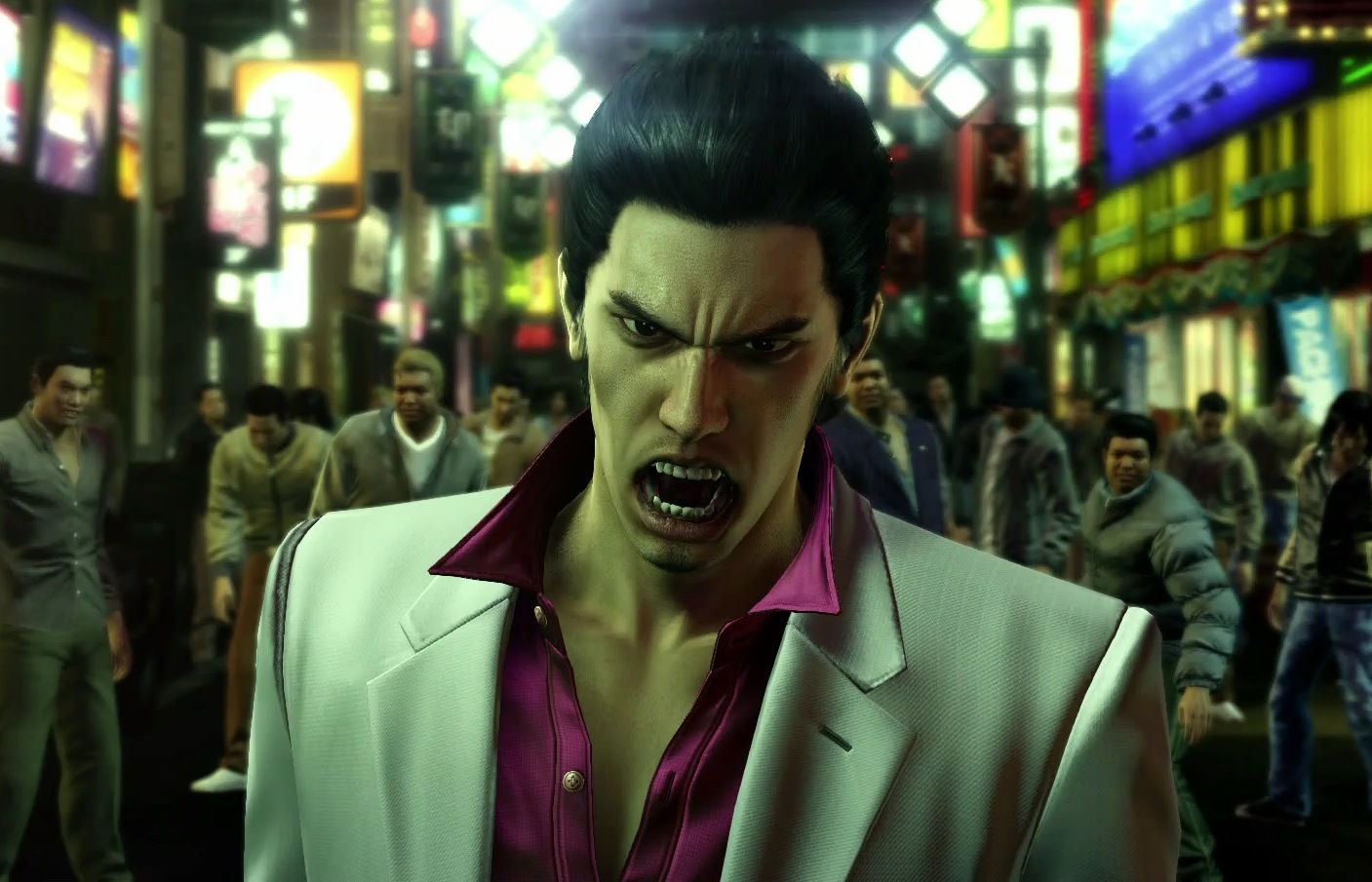Breathlessly you charge up what must be the fourth or fifth set of stairs. Broken jaws, crumpled figures, and a fair share of shattered furniture lay behind you. Wave after wave continues to come. Popping out of doorways, using all weapons, and emerging quicker than seems possible. Yet, still you go. This is a cause bigger than yourself. Yes, bigger than the Dragon of Dojima. You finally, thankfully, burst through the final doorway and stand atop the roof of this abandoned building in the midst of downtown. You see the crowd awaiting you, a slow smirk spreads across your face, and looking out at everyone you think one single solitary thought: I guess I’ve got one more in me. Then, without looking back, you charge full steam ahead plowing through the field of vanquished foes and leap across the roof to the next building. It’s spectacular. It’s insane. It’s Yakuza Kiwami, and it’s glorious.
The above scene, occurring late in the game’s runtime, is a wondrous mixture of the Matrix, TheRaid, and John Wick, all blending perfectly together in an over the top, arcadey, and harmonious act of fighting that is the purest piece of gameplay fun I’ve experienced this year. It is one man marshalling everything within himself and taking on an entire building of foes, in a frantic, kinetic, frenzied, and absurdly beautiful action set piece that bleeds from one fight to the other in seamless fashion.
This is in large part because of the man at the center of it, Kazuma Kiryu, the Dragon of Dojima. His tale in Yakuza Kiwami is operatic, shark-jumping, sweeping, messy, and truly Shakespearean in it’s grand personal tragedy. Along the way, Yakuza Kiwami was transformed from a generic “Japanese PS2 GTA clone” to something that quite simply left me floored by its character arcs, emotion, tragedies, and grand odyssey at the heart of it all. This is not a Grand Theft Auto game, not at all. It is a story inspired far more by Shakespeare and classic Greek mythologies then by the Houser brothers’ newest title.
Kazuma Kiryu, the Dragon of Dojima, is a leading man unlike any other I’ve encountered in an open-world crime epic. This comes in large part due to the games adamant declaration that Kiryu is not a bad guy, that Kiryu is a man of honor and good in a world losing sense with itself, that despite his Yakuza past, he is not bad.
This is all in direct conflict with essentially the entirety of the genre Yakuza finds itself in. Tommy Vercetti, C.J., Niko, and the trio of anti-heroes at the center of GTA 5 are all criminals. They are the bad guys and they are aware of it. The greatest of any of the Grand Theft Auto protagonists is Tommy from Vice City, a man who just wants to be the greatest gangster the city has ever seen. He is unrepentant in his lifestyle choices, unabashed in his ambitions and dreams, and totally brilliant to watch in his conquest and epic mission to take on all of Vice City. He is angry, loyal, funny, brutal, and uncompromising in the totality of his character. A massively flawed human who accepts the huge gulfs in his personality as the price of playing in the criminal life.
Kazuma Kiryu is none of those things. He is not a bad guy. He doesn’t want to be the greatest gangster in Japan. I’m not entirely convinced he has been too happy with the direction and path of his life. His ten year imprisonment that occurs during the opening few hours of the game serves to sever one era of his life from another. He walks out the gates of the prison near Christmas 2005 to a world that has changed but Kiryu has remained a man of honor, a Yakuza who wants to do good by the people, not terrify them and rob them of their money. He noticeably rejects an attempt to set up a casino scheme because he doesn’t feel good about taking the money off people just trying to have fun. In short, he’s not really much of a criminal at all.
The gameplay also seems to push Yakuza away from being another generic open-world crime game. Indeed, in many ways Yakuza is more a fighting game then a giant open-world mammoth. To a frustrating degree at times what you do is fight in Yakuza. No matter where you are or what your trying to do it, it is going to end in Kiryu being forced to pick up his fists yet again, like a boxer who can’t quit the game. This gets repetitive, this forces the game into silly situations at times (i.e. getting in fights for the slightest incidents on the street or for daring to walk around outside for more than twenty seconds) and it approaches tiring early on when the game is still establishing things.
Yet, what this fighting spirit also does is lead to moments of gameplay perfection, like the above moment late in the game where a fired up, energized, and driven Kazuma Kiryu races across the city looking to save someone. That quest leads him across the city before ultimately coming to a deserted building and in a moment of total abandonment and simultaneous realization of what it can be, Yakuza tasks you with getting to the very top. Fighting floors and floors of enemies and engaging in a giant, epic, sweeping, and cartoonishly brutal odyssey to the roof. Picking those mighty fiery fists of the Dragon of Dojima up, the game lets itself off the leash and embraces its craziest ideas. Floors fly by, jaws are shattered, Yakuza are smashed through doors opening new routes, and Yakuza Kiwami turns into a beautiful, perfect section of gameplay, story, and rush of adrenaline and excitement coming together that is among the greatest things I’ve played this entire year. I can’t begin to describe the visceral way the game continued to raise my energy levels and the pure bliss of its gameplay during this chapter of the game. It was perfection on a game design level. Again, not every moment in the slightest is like that, but when things click together, they do so brilliantly.
So let’s stop dancing around the elephant in the room, Yakuza Kiwami is a PS2 game. A pretty one, indeed stunning in its cutscenes the characters and world coming alive in beautiful fashion, but a PS2 game nonetheless. It’s world map is tiny by today’s standards, but even by PS2 game standards it’s not big. Any of the PS2 Grand Theft Auto games had a far bigger map. Hell, Jak 2 had a bigger world. The thing is it kind of works for Yakuza, you want to be racing across this city quickly and the more compact size and nature of everything allows for this. Then there’s the fact that you can actually go inside of a fair amount of the buildings you see; clubs, stores, resturants, game stores, and more litter the city and add to the frenzied, always awake feeling of Kamurocho.
Its PS2 heritage can shine through in odd ways though. At one point there came a key story beat where a character was stabbed in the stomach and his fate was left up in the air, and a few minutes later he was challenging me to a fight via the Majima Everywhere System. To say nothing of a recently killed character texting me asking me to go hang at a bar, which was about the most ominous PSA against drinking I’ve ever received. The game is full of little quirks and problem areas. Chief among them to me is the story is just too long, there’s too much fat around the bones, things that simply should have been cutscenes or just cut altogether instead of me playing through them.
Whether it’s me running back and forth between a friend and a pawn shop employee trying to get more and more money to purchase something, or running to various different convenience stores trying to buy dog food for 30 minutes in a mission baffling in its difficulty to find said dog food and also in its existence at all. Yakuza Kiwami seems scared that if it’s not constantly giving the player mundane tasks to perform they will simply walk away from it. The game is 13 chapters long and many, particularly in the fantastic back half, are great, but after a pop in the early stages of the game, things do drag a little because of what you’re being tasked to do. How many times can Haruka really be kidnapped before it becomes annoying? Nevertheless, the unquestioned star of Yakuza Kiwami remains it’s story and what a story it is.
I mentioned earlier how Kiwami’s story is Shakespearean in its nature and I meant every word of that. Particularly regarding the relationship and character arcs of Nishikiyama and Kiryu. Nishiki’s ten year development while Kiryu was in prison is shown via flashbacks interspersed throughout the game. It is powerful and incredibly emotional to see a man slowly fall apart and embrace his darkest demons. It is the very bad day principle stretched out over many bad days and watching as Nishiki and everything he loves is broken and shattered is staggering. Adding empathy and humanity to a character who otherwise would simply be another notch in genric friend becomes foe stories. Here it is given so much soul as Nishiki puts forth a classic character and left me questioning, thinking, and despairing over the events of the game long after they ended.
Yet, Nishiki is just one brilliant piece of a larger, beautifully realized tapestry. From the crazed antics of Majima, to the terror of Shimano, to the fantastic, intersecting layers of intrigue, drama, and twists that occur but that importantly never feel cheap or forced, Kiwami leaves a brilliantly crafted tale in its wake with the familial dynamics between Kazama, Kiryu, and Haruka leaving a particularly great mark. The sins of the father, the sins of the past and their consequences weigh heavily on the conscience of Yakuza and the people within it. Kiryu gave ten years of his life to prison to protect another. Lives are lost, transformed, and fate kept away in this world, but the sins of the father and sacrifices made to expunge them remain.
This is showcased nowhere stronger then in the bond between Kiryu and Haruka. The level of personal loss suffered by the pair and the warmth and affection that grows between this surrogate father and daughter is one that constantly broke and repaired my heart throughout the game’s tale. It is a different kind of love then we are used to seeing, but one that leaves behind a strikingly powerful series of images and moments building to the game’s final seconds.
Closing Thoughts
Yakuza Kiwami is an absurdist tale of fate, guilt, and the weight of the past. It annoys, badgers and frustrates in it’s pacing, repetitiveness, and goofy PS2 missteps. Yet, when all is said and done, it presents a beautiful tragedy, one full of loss, ideals, and deeply personal stakes. The legacy and burden of your heroes being real people. The traumas you try to outrun or bury inside of you. It is funny, it is very, very Japanese, and above all, it is a classic story rendered in beautiful fashion via the PS4. Yakuza Kiwami, Kazuma Kiryu, and Akira Nishikiyama are a tale to remember, characters that leave a mark, and a game that simply wows with it’s fantastic gameplay and its emotional, tragedy draped, redemption filled odyssey.
Yakuza Kiwami was reviewed using a digital code provided by the publisher on a standard PlayStation 4 system.








